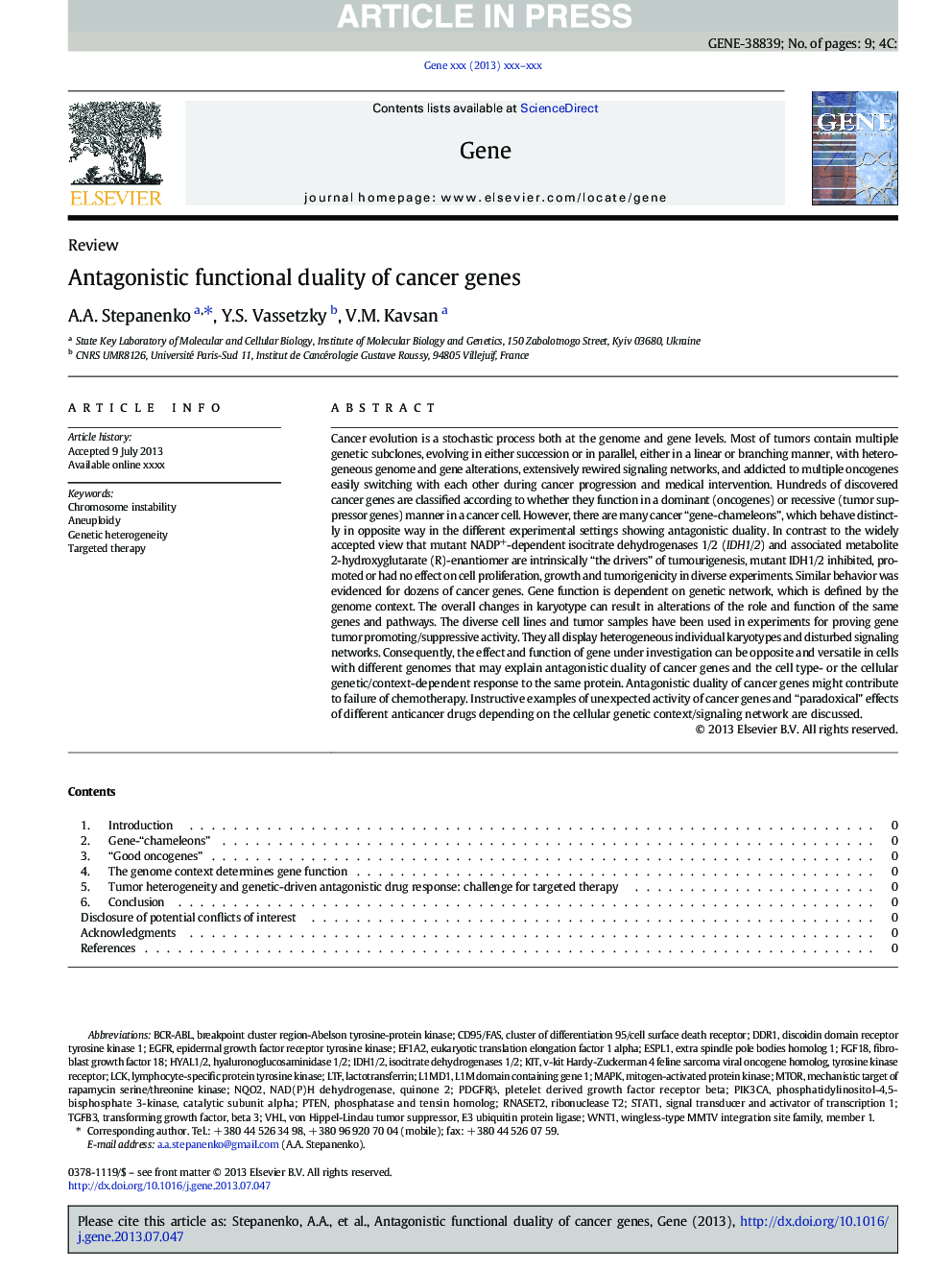| کد مقاله | کد نشریه | سال انتشار | مقاله انگلیسی | نسخه تمام متن |
|---|---|---|---|---|
| 5906152 | 1159958 | 2013 | 9 صفحه PDF | دانلود رایگان |
عنوان انگلیسی مقاله ISI
Antagonistic functional duality of cancer genes
ترجمه فارسی عنوان
دوگانگی عملکرد آنتاگونیستی ژن های سرطانی
دانلود مقاله + سفارش ترجمه
دانلود مقاله ISI انگلیسی
رایگان برای ایرانیان
کلمات کلیدی
NQO2FGF18RNASET2BCR-ABLLCKLTFPIK3CAVHLWnt1DDR1PDGFRβIDH1/2CD95/FasTGFb3mTORfibroblast growth factor 18EGFRMAPK - MAPKStat1 - sTAT1Aneuploidy - آنیوپلوئیدی Chromosome instability - بی ثباتی کروموزومTargeted therapy - درمان هدفمندphosphatase and tensin homolog - فسفاتاز و تنسین همولوگphosphatidylinositol-4,5-bisphosphate 3-kinase, catalytic subunit alpha - فسفاتیدیلینوزیتول-4،5-بیسفسفات 3-کیناز، واحد کاتالیزوری آلفاLactotransferrin - لاکتوتانسفرفرینsignal transducer and activator of transcription 1 - مبدل سیگنال و فعال کننده رونویسی 1Genetic heterogeneity - ناهمگنی ژنتیکیlymphocyte-specific protein tyrosine kinase - پروتئین تیروستین کیناز خاص لنفوسیتmitogen-activated protein kinase - پروتئین کیناز فعال با mitogenPten - ژن PTENKit - کیت
موضوعات مرتبط
علوم زیستی و بیوفناوری
بیوشیمی، ژنتیک و زیست شناسی مولکولی
ژنتیک
چکیده انگلیسی
Cancer evolution is a stochastic process both at the genome and gene levels. Most of tumors contain multiple genetic subclones, evolving in either succession or in parallel, either in a linear or branching manner, with heterogeneous genome and gene alterations, extensively rewired signaling networks, and addicted to multiple oncogenes easily switching with each other during cancer progression and medical intervention. Hundreds of discovered cancer genes are classified according to whether they function in a dominant (oncogenes) or recessive (tumor suppressor genes) manner in a cancer cell. However, there are many cancer “gene-chameleons”, which behave distinctly in opposite way in the different experimental settings showing antagonistic duality. In contrast to the widely accepted view that mutant NADP+-dependent isocitrate dehydrogenases 1/2 (IDH1/2) and associated metabolite 2-hydroxyglutarate (R)-enantiomer are intrinsically “the drivers” of tumourigenesis, mutant IDH1/2 inhibited, promoted or had no effect on cell proliferation, growth and tumorigenicity in diverse experiments. Similar behavior was evidenced for dozens of cancer genes. Gene function is dependent on genetic network, which is defined by the genome context. The overall changes in karyotype can result in alterations of the role and function of the same genes and pathways. The diverse cell lines and tumor samples have been used in experiments for proving gene tumor promoting/suppressive activity. They all display heterogeneous individual karyotypes and disturbed signaling networks. Consequently, the effect and function of gene under investigation can be opposite and versatile in cells with different genomes that may explain antagonistic duality of cancer genes and the cell type- or the cellular genetic/context-dependent response to the same protein. Antagonistic duality of cancer genes might contribute to failure of chemotherapy. Instructive examples of unexpected activity of cancer genes and “paradoxical” effects of different anticancer drugs depending on the cellular genetic context/signaling network are discussed.
ناشر
Database: Elsevier - ScienceDirect (ساینس دایرکت)
Journal: Gene - Volume 529, Issue 2, 25 October 2013, Pages 199-207
Journal: Gene - Volume 529, Issue 2, 25 October 2013, Pages 199-207
نویسندگان
A.A. Stepanenko, Y.S. Vassetzky, V.M. Kavsan,
